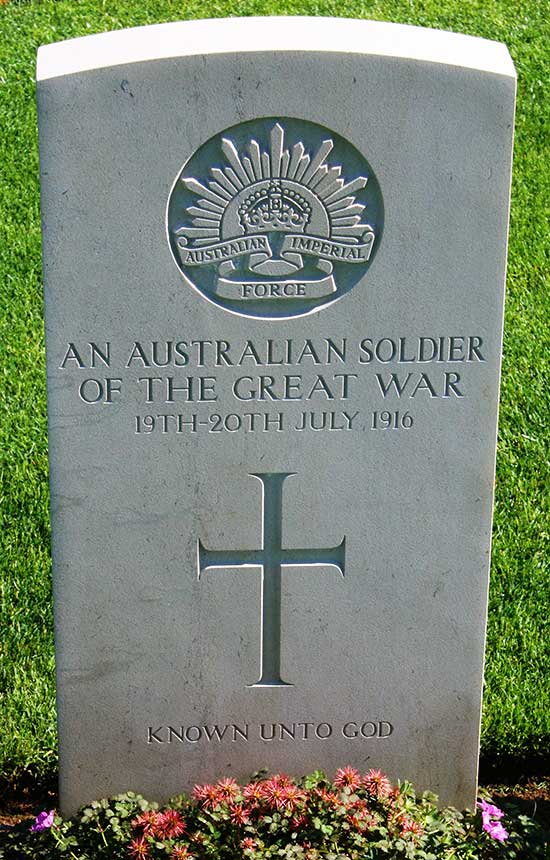
Author and Poet, Rudyard Kipling, 1865-1936.
EPITAPHS OF WAR
Poet Rudyard Kipling and “The Missing”

Author and Poet, Rudyard Kipling, 1865-1936.
Rudyard Kipling was one of most popular poets in the late-Victorian and Edwardian eras – during which time the British Empire reached its zenith, preceding the outbreak of the First World War. Kipling’s work captured the romantic and adventurous bravado that was popularly assumed to be the key to Britain’s global dominance.
“IF…”
[Excerpt - By Rudyard Kipling, 1910]
…If you can force your heart and nerve and
sinew
To serve your turn, long after they are gone,
And so hold on when there is nothing in you,
Except the Will which says to them: 'Hold on!'
…If you can fill the unforgiving minute
With sixty seconds' worth of distance run -
Yours is the Earth and everything that's in it,
And - which is more –
You'll be a Man, my son!
Kipling was initially a strong supporter of the Great War. In 1914 he pulled strings to get his 17-year-old son John commissioned into the Irish Guards, despite the boy having been previously rejected due to poor eyesight. Tragically, just a few weeks after arriving in France and having celebrated his 18th birthday, John was killed and lost without trace (“Missing in Action”) in the Battle of Loos, just north of Arras, on 27 September 1915.
The loss of his only son came as a profound shock to Kipling and destroyed his illusions about the War:
Have You News of My Boy Jack?
[By Rudyard Kipling, 1915]
'Have you news of my boy Jack?'
Not this tide.
'When d’you think that he’ll come back?'
Not with this wind blowing, and this tide.
'Has any one else had word of him?'
Not this tide.
For what is sunk will hardly swim,
Not with this wind blowing, and this tide.
'Oh, dear, what comfort can I find?'
None this tide,
Nor any tide,
Except... He did not shame his kind.
- Not even with that wind blowing, and that tide.
Then hold your head up all the more.
This tide,
And every tide.
Because he was the son you bore,
And gave to that wind blowing, and that tide!
Kipling later devoted himself to helping the Imperial War Graves Commission; also searching their records and cemeteries in a vain effort to find his son’s unmarked grave.
Kipling never did locate his son, but today his contribution to the reverent atmosphere of all the war cemeteries is visible on the central Stones of Remembrance, where he chose the biblical words:
“THEIR NAME LIVETH FOR EVERMORE”

In addition, the vast numbers of headstones for “Unknown” casualties are all marked with Kipling’s phrase:
“KNOWN UNTO GOD”

- A poignant echo of his own loss, since these words also marked the grave of his own “missing” son.

Carrie and Rudyard Kipling at the Loos Battlefield
Memorial.
In the aftermath of the Great War, Kipling wrote a strident poem lamenting the war dead, Epitaphs of the War. Its form was reminiscent of the marble inscriptions of the war cemeteries.
He included several references that seem to have a deep personal resonance:
Epitaphs
of the War
[Excerpts - By Rudyard Kipling, 1920]
…A SON
My son was killed while laughing at some jest.
I would I knew
What it was,
And it might serve me in a time
When jests are few.
…AN ONLY SON
I have slain none except my Mother. She
(Blessing her slayer) died of grief for me.
…COMMON FORM
If any question why we died,
Tell them: Because our fathers lied.
Kipling died in 1936, never having known what had happened to his son Jack.
The King's Pilgrimage
[Excerpt - By Rudyard Kipling, 1922]
...All that they HAD, they gave.
- They Gave.
And they shall not return.
For these are those that have no grave,
Where any heart may mourn...
In 1992, the grave of Lt. John Kipling of the 2nd Battalion, Irish Guards, was finally identified by the Commonwealth War Graves Commission...

St
Mary's A.D.S. Cemetery, situated peacefully amongst fields
behind the old Loos Battlefield, Commune of Hasnes, France.
![]()
The Children
[By Rudyard Kipling, published
1917, in his book "A Diversity of Creatures"]
But who shall return us our children?
“LEST WE FORGET”
- Another famous phrase coined by Kipling (in his 1897 poem “Recessional”).
Explanatory text by James Oglethorpe.